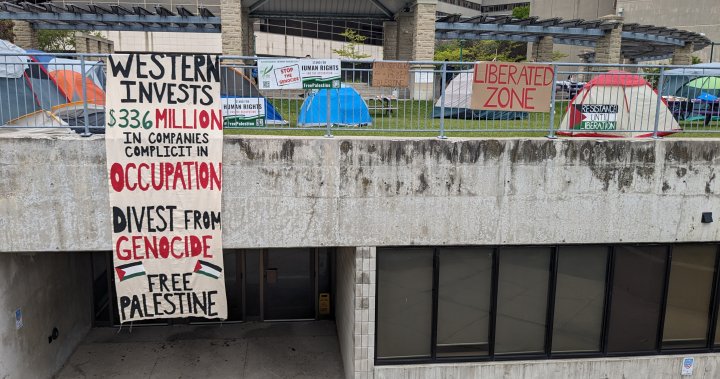
Western U president suggests divestment from Israel not possible as encampment continues
Global News
Western University President Alan Shepard and the Western Divestment Coalition are trading public statements as a pro-Palestinian encampment continues.
The president and vice-chancellor of Western University in London, Ont., has issued a statement roughly three weeks into a pro-Palestinian encampment on university grounds, in which he suggests that a principal demand from protestors is not feasible.
Protestors under the group Western Divestment Coalition, like their counterparts at campuses across North America, have been calling on Western to divest from Israel-connected funds in light of the ongoing conflict in Gaza amid the Israel-Hamas war.
President Alan Shepard said in the open letter to the entire Western community that the institution’s investments are publicly available and that it does not invest directly into companies but rather through pooled funds curated by external fund managers.
“Assuming divestment was possible, many experts have argued that this approach would have limited to no impact on the issues at hand – while at the same time requiring organizations like universities to dismantle their entire investment model to address a very small percentage of assets,” Shepard writes.
“At the same time, Western’s longstanding commitment to responsible investing grows stronger each year and in 2023 we became a signatory to the United Nations-sponsored Principles for Responsible Investment (PRI), joining a global initiative to advance responsible investment practices.”
The Western Divestment Coalition, however, points to the PRI as well as the university’s own Policy 2.26 which includes a section on responsible investing that outlines that while engagement is preferred over divestment, “divestment will be considered where engagement has failed or is not feasible.”
In regards to partnerships with other academic institutions, Shepard’s letter states that Western “will not hold academic colleagues accountable for the decisions of their government.”
Shepard also noted that universities typically do not take unilateral stances on political or social issues because “by our very nature, universities do not speak with one voice.”











